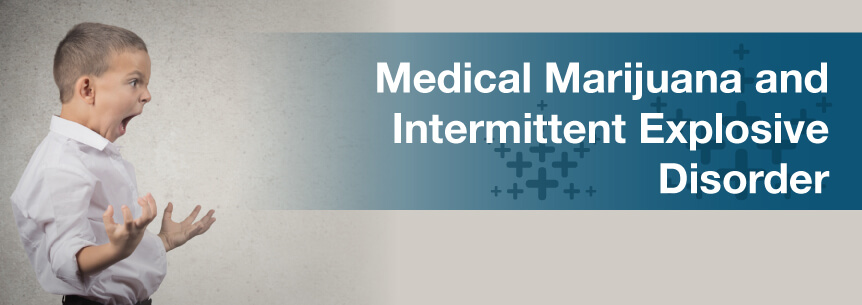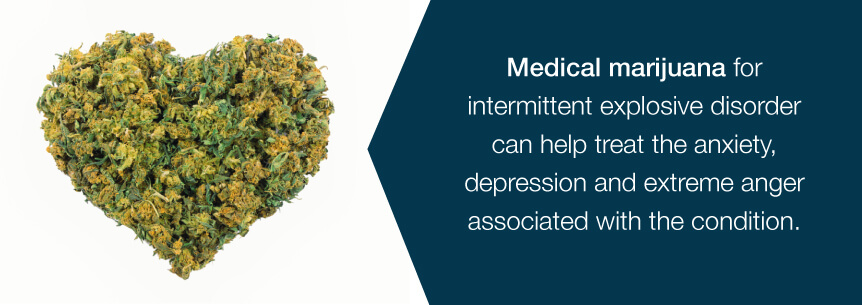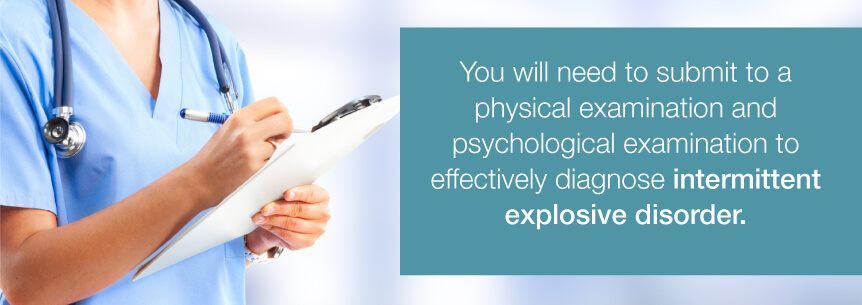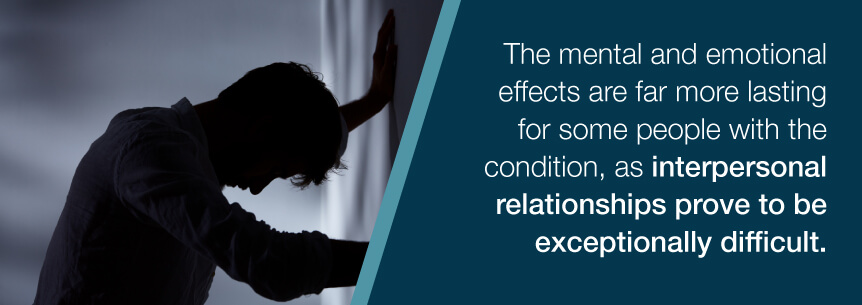
Intermittent explosive disorder (IED) is a condition affecting children and adults involving short episodes of intense and uncontrollable anger or aggression without apparent cause. The Guardian estimates nearly 16 million Americans suffer from this often-underdiagnosed condition.
Those with intermittent explosive disorder “explode” into anger or rage for no reason or grounds. People suffering from IED feel as though they become overcome with anger and can’t control their emotions. They may threaten or attack humans, animals or objects.
Medical marijuana for intermittent explosive disorder can help treat the anxiety, depression and extreme anger associated with the condition. It helps address other mental and physical issues as well.

Individuals with IED often struggle with intense bouts of anger — in some cases over the smallest issue. A good example is road rage, where you feel extreme anger while driving for things like:
The anger people experience with this disorder can ruin their day — sometimes their life. However, medical pot, thankfully, may help get these anger issues under control, and potentially better than other medications on the market.
Medical cannabis for intermittent explosive disorder may cause a mild anxiety attack in itself for some people when users smoke it, depending on the strain. However, the correct strain tends to calm most individuals down.
The goal of marijuana use for IED is not necessarily to get your mind away from the underlying issue making you angry, but instead calm you down enough to evaluate the issue rationally and fix it properly.
Individuals often react without thinking when angered and say whatever is on their mind at that exact moment. Not pausing to think before speaking can lead to serious problems. Using cannabis and intermittent explosive disorder treatment will help you think through your actions during a situation that has made you angry, so you can react properly.
Find A Doctor Find A Dispensary
Conventional IED treatments typically include both psychotropic medications and cognitive behavioral therapy. They’ve shown some success, although limited, and with side effects in some cases. Some patients refuse to take certain drugs, such as prescribed opiates, for example, because they alter their mood in an unnatural manner. Opiates are also highly addictive.
Intermittent explosive disorder is associated with other conditions like:
Marijuana is an excellent treatment for these types of conditions.
Medical cannabis has shown to temporarily provide relief for unmanageable pain, short-term pain or pain with no identifiable source.
Medical weed users report relief from:

Medical marijuana’s active cannabinoid, THC, tends to work well in altering mood and providing individuals with a serene and calm view of the world surrounding them. Marijuana’s ability to modify a patient’s “fight-or-flight” impulse response turns it into an ideal solution for intermittent explosive disorder.
When suffering from anger problems like IED, you can benefit from cannabis for intermittent explosive disorder treatment’s effects, using it to help clear and calm your mind from irrational thoughts, replacing them with positive thoughts instead.
Some good marijuana strains for intermittent explosive disorder to help with things like anger, stress and anxiety include:
Strains for anger include:
Strains for anxiety and stress include:
You have various methods of delivery for your marijuana and intermittent explosive disorder therapy, such as:
Inhalation
Oral
Topical
Medical cannabis helps those who struggle with mental disorders, including intermittent explosive disorder. It provides you with a natural, safe alternative to habit-forming and dangerous drugs. Many of the conventional medications doctors prescribe can damage your mind and body when you use them long-term.
Some patients take a combination of medicines to treat their condition and relieve their symptoms. However, combining medications increases your risk of having them interact with one another and worsen your health problems, particularly if you’re not in good contact with your physician. Of course, cannabis and intermittent explosive disorder treatment is no different than any other method, where you still need to consult with your doctor before using it.
Medical cannabis deserves another look at the benefits and medical applications it provides, not only for intermittent explosive disorder, but also for a wide range of ailments. When you use it together with other therapies and treatments, it’s a more affordable, natural and safer way to treat your IED and its symptoms.
Here at Marijuana Doctors, we can help you find an experienced cannabis doctor to get your recommendation for cannabis treatment. Take a look through our medical weed directory to connect with qualified medical marijuana doctors and locate cannabis dispensaries in your area. We have professional and experienced experts waiting to answer your questions, along with a multitude of resources to offer you guidance today for your medical cannabis needs.
Find A Doctor Find A Dispensary
Intermittent explosive disorder is an impulse control disorder characterized by victims’ failure to resist aggressive impulses. This extreme aggression often manifests in the form of assaulting people verbally, destroying property and displaying fits of temper.
IED outbursts typically last fewer than 30 minutes. The episodes may be frequent or separated by periods of weeks or months without an incident. You, or your loved one who has intermittent explosive disorder, may feel irritable, aggressive, impulsive and angry most of the time.
The symptoms of IED seem to revolve around a common theme: rage. In fact, unexplainable rage is one of the first signs of the disorder. Other symptoms include:
Some people experience overwhelming relief or exhaustion after an episode and may feel regret, remorse or embarrassment once they’ve calmed down afterward.
Domestic violence can also be a symptom of intermittent explosive disorder. If a loved one is hurting you during violent explosive outbursts, remove yourself from harm’s way and seek help.
There isn’t a simple blood test people can take to determine whether or not they may have IED. With so few willing to come forward and admit they have this condition, it’s often difficult to accurately diagnose IED in the first place. You will need to submit to a physical examination and psychological examination to effectively diagnose intermittent explosive disorder, and some physicians may need to consult the Diagnostic and Statistical Manual of Mental Disorders (DSM-5).

According to the National Institutes of Health (NIH), to receive an IED diagnosis, you must experience three episodes of impulsive or uncontrollable anger in which you did one of the following:
If you have three recorded episodes within a year — particularly if the attack involved people and property, a physician may identify you as someone having a more persistent and severe form of IED.
The precise cause of IED is currently unknown. Many researchers believe it is a combination of factors, including biological, physical and environmental factors — as many people who have intermittent explosive disorder grew up in households where physical and verbal abuse were present. There is some evidence serotonin may play a role in developing IED, reports Psychology Today.
Some of the most commonly blamed risk factors for intermittent explosive disorder include:
Mental health disorders possibly associated with developing intermittent explosive disorder, according to the Mayo Clinic, include the following:
There is no cure for IED. However, treatments have proven effective to some degree, and behavior modification and relaxation treatments have offered relief from some intermittent explosive disorder symptoms.
Because experts know so little about what will set people with the condition off, preventing IED incidents can be challenging. Sticking with treatment protocols is a good step in the right direction, as is following relaxation techniques and treatments you’ve learned in therapy. Avoiding situations where you might become upset or enraged can be highly helpful.
In 1980, the American Psychiatric Association first recognized intermittent explosive disorder as a mental disorder. Today, the DSM-5 is the definitive voice when it comes to recognizing and diagnosing mental disorders, and they are calling for new criteria for the identification of conditions like IED and similar disorders.
When it comes to disorders like this one, most changes are designed to help medical professionals make a more accurate diagnosis in hopes future cases receive speedier identification, so patients can get faster help to avoid adverse outcomes.
Patients with IED must consider the physical, mental and emotional or mental effects.
Physical effects include a variety of complications resulting from accidents and injuries from fighting while having an episode.

The mental and emotional effects are far more lasting for some people with the condition, as interpersonal relationships prove to be exceptionally difficult. The following are among the more profound emotional effects of IED.
It’s difficult to love someone with IED through the worst of their condition. However, there is light at the end of the tunnel. The effects of the condition tend to lessen with age and with intensive therapy, medical treatments and behavioral treatments designed to help victims cope with their situations. Medical marijuana can also help patients cope with the disorder.
People with IED who have more than three episodes in one year account for nearly 3.5 times more property damage, according to the NIH, than those who have less frequent episodes. Most people who have the disorder suffer from 43 attacks in the course of their lifetimes. NIH also reports, in any given year, almost 4 percent of adults experience IED, translating to up to 8.5 million Americans dealing with the condition.
According to Harvard Medical School, people who have IED may have dozens of episodes within their lifetimes — some requiring medical attention and “causing thousands of dollars in property damage.”
Most medical professionals believe many people who have intermittent explosive disorder don’t seek treatment for their conditions. The Harvard Health Publishing report mentions in people who have the disorder, fewer than 20 percent seek treatment for their violent impulses or attacks of impulsive rage.
Treatments for IED fall into three categories:
Medication
Selective serotonin reuptake inhibitors could frequently help moderate symptoms and stabilize mood as effectively as anticonvulsant mood stabilizers and other drugs, according to the Mayo Clinic.
There are always side effects to consider with medication — especially the strong SSRI antidepressants and mood stabilizers to treat IED. Many patients, desperate to have positive interactions with loved ones and better all-around interpersonal skills, are willing to live with the common side effects, which may include:
Psychological Treatment
Patients with IED can attend intense psychotherapy sessions, including cognitive behavior therapy. These sessions help identify potential triggers to learn how to manage or control anger responses.
Behavioral Treatment
Doctors often recommend behavioral modifications for IED patients, including things like:
Dedication to treatment is one of the most effective things patients who have this condition can do until they learn what it takes to control the rage that has controlled them in the past.
There is much to learn about intermittent explosive disorder. One of the most important things to understand is people who have this condition are victims too. People who need help can get it from qualified medical and health care professionals.